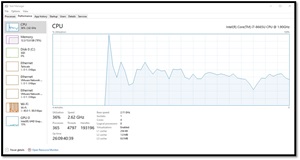In-Depth
DEX in the Workplace
Over the past few years, a new term has emerged in the physical and virtual End User Computing (EUC) workspace: Digital Employee Experience (DEX). In this article, I will explain why DEX is important, the components that make up DEX, some of the key players in this field, and where it is headed.
Pre-DEX
In the past, EUC monitoring companies gathered hundreds of metrics from computers and endpoints to gauge users' work experiences. However, this method relied on interpretation by skilled workers and only provided a guess as to how well the worker's experience was based on the collected data.
 [Click on image for larger view.]
[Click on image for larger view.]
With DEX, we can gain more precise insights into the actual worker's experience, marking a significant step forward in end-user satisfaction and digital workplace management.
DEX
DEX refers to the quality and efficiency of digital tools and environments, not just the metrics from the desktop that employees interact with. In the EUC world, DEX encompasses the desktops, applications, and physical devices employees use to perform their jobs. The focus is on how these technologies empower employees to be productive, collaborate effectively, and feel engaged with their work. This is particularly useful in remote or hybrid work settings.
DEX in EUC is not just a technical concept but a critical factor that directly influences employee productivity and job satisfaction. A well-integrated and seamless computing environment can significantly enhance efficiency, leading to better performance and higher morale. Conversely, poor DEX, such as slow virtual desktops or unreliable applications, can result in frustration, reduced efficiency, and, in extreme cases, greater employee turnover. The impact of DEX on these crucial aspects of the workplace cannot be overstated.
The reality is that DEX in the EUC space is complex and challenging, as it needs to take a multifaceted approach involving various components such as virtual desktops, application performance, remote access solutions, and other factors. It includes the devices employees use, like the physical desktops, thin clients, the virtual desktops they connect to, and the applications they rely on, whether hosted on-premises or in the cloud. Additionally, network performance, application availability, and the support services provided by IT departments play a critical role in a user's digital experience. Ensuring these elements are cohesive and responsive is critical to a successful EUC workplace.
Several companies are at the forefront of enhancing and managing DEX in the EUC space, and I may cover these in a separate article. We are also seeing all the major providers of VDI providing their own solutions, and some of the legacy EUC monitoring companies are implementing DEX into their portfolios.
DEX and AI
One of the most exciting developments with DEX is its embrace of AI. With AI, you can correlate the causation of events that cause less than optimal end-user experience with logs and metrics. This enhances customer support and proactively prevents workplace disruptions.
But this is not about detecting current issues as AI can crunch through captured historical data to prevent events from happening in the future.
DEX and Automated Help Desks
AI is not just about combing through data; it can also enhance user support through automated help desks and virtual assistants. These can resolve common issues quickly and efficiently, freeing the support staff to do more productive and interesting work.
Many DEX solutions can provide automated workflows, and predictive analytics help IT teams anticipate and address potential disruptions before they impact users.
These technologies significantly enhance the digital experience for end users by reducing the time spent on manual tasks and minimizing downtime, allowing them to focus more on their core tasks.
Organizations will continue to evolve their EUC strategies to accommodate remote and hybrid work environments, and DEX will remain a top priority for companies. Integrating advanced technologies like AI with DEX will further enhance and personalize the digital experience, making EUC environments more adaptive and user-friendly. Companies that invest in improving DEX within their EUC frameworks will see benefits in employee satisfaction, productivity, and overall business performance, positioning themselves as leaders in the digital workplace.
About the Author
Tom Fenton has a wealth of hands-on IT experience gained over the past 30 years in a variety of technologies, with the past 20 years focusing on virtualization and storage. He previously worked as a Technical Marketing Manager for ControlUp. He also previously worked at VMware in Staff and Senior level positions. He has also worked as a Senior Validation Engineer with The Taneja Group, where he headed the Validation Service Lab and was instrumental in starting up its vSphere Virtual Volumes practice. He's on X @vDoppler.